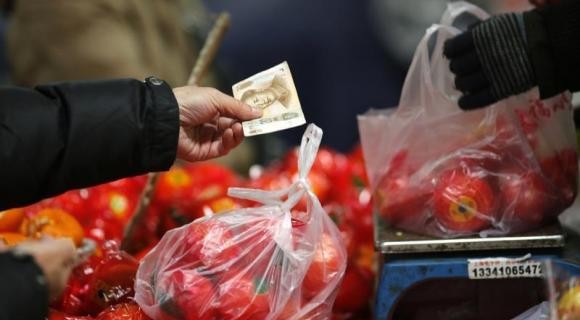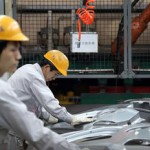China consumer prices rise, but industry deflation persists

China’s consumer inflation rate increased in March as fresh food prices jumped, but persistent deflation in the industrial sector was another signal of weak demand and slowing growth in the world’s second-largest economy.
The consumer price index (CPI) rose 2.4 percent in March from a year earlier, the National Bureau of Statistics said on Friday, more from a 2.0 percent rise in February but just below the median forecast in a Reuters poll.
Fresh food prices were a major contributor, with fruit prices up an annual 17.3 percent and vegetables up 12.9 percent, although analysts said food inflation was showing signs of moderating. Pork prices fell 6.7 percent from a year earlier.
Producer prices fell in annual terms for the 25th straight month, dropping 2.3 percent, slightly more than expected.
“Overall, we expect inflation pressures to remain benign amid tepid domestic demand,” Barclays economists said in a report.
Weak trade data this week added to an almost unabated run of disappointing data this year. Authorities have ruled out any major stimulus to boost the economy, although they have announced some smaller, targeted measures.
“The current environment in some ways serves as a litmus test for the government’s commitment to allowing a more “decisive” role for market forces in the economy – market forces would drive up the cost of scarce resources, raising CPI inflation,” said Bill Adams, senior international economist for PNC Financial Services, in an emailed comment.
Annual economic growth is forecast to have slowed to a five-year low of 7.3 percent in the first quarter from 7.7 percent at the end of 2013, a Reuters poll shows. The data is due on April 16.
BELOW TARGET
The consumer price index rose 2.3 percent in the first quarter from a year earlier, to be running below the government’s 2014 target of about 3.5 percent.
While consumer prices have steadily risen, producer prices fell at the quickest pace in eight months in March, driven primarily by drops in mining and metal costs.
There is no consensus on what the persistent fall in the PPI implies. Some analysts say it reflects sluggish consumer demand, and others say it is a result of excess capacity in a handful of raw material industries including cement, glass, and steel.
“The lingering deflation trend in the PPI seems more worrying, as it reflects structural overcapacity in a number of sectors as well as the cyclical downturn in the industrial sector,” said Haibin Zhu, JP Morgan’s chief China economist.
“Inflation is unlikely to become a priority policy concern in the near term.”
(By ADAM ROSE)
(Editing by John Mair)
Source: reuters




























